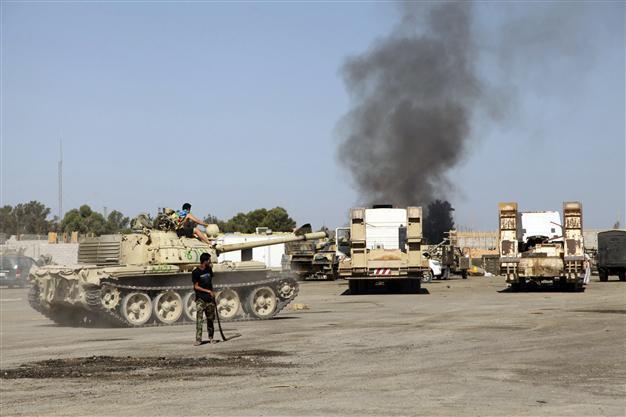US says UAE bombed Libya Islamists as turmoil deepens
TRIPOLI - Agence France-Presse

Smoke is seen rising from the Brigade Qaqaa headquarters, a former Libyan Army camp known as Camp 7 April, behind members of the Libya Shield, following clashes between rival militias at the Sawani road district in Tripoli, August 24, 2014. REUTERS Photo
UAE warplanes secretly bombed Islamist militia targets in Libya, apparently catching Washington off guard, as turmoil in the North African country deepened with the Islamists naming a rival premier.American officials said on Aug. 25 that the United Arab Emirates' jets launched two attacks in seven days on the Islamists in Tripoli using bases in Egypt.
The strikes signalled a step toward direct action by regional Arab states that previously have fought proxy wars in Libya, Syria and Iraq in a struggle for power and influence.
The bombing raids were first reported by The New York Times, and Islamist forces in Libya had also alleged the strikes had taken place.
"The UAE carried out those strikes," one American official told AFP on condition of anonymity.
Asked about the account, a senior US official said "the report is accurate".
The United States did not take part or provide any assistance in the bombing raids, said the two officials, who could not confirm that Egypt and the UAE had left Washington totally in the dark about the attacks.
The first strikes took place on Monday last week focusing on targets in Tripoli held by the militias, including a small weapons depot, according to the Times. Six people were killed in the bombing.
A second round was conducted south of the city early Saturday targeting rocket launchers, military vehicles and a warehouse, the newspaper said.
Those strikes may have been a bid to prevent the capture of the airport, but the Islamist militia forces eventually prevailed and seized it despite the air attacks.
The UAE -- which has spent billions on US-manufactured warplanes and other advanced weaponry -- provided the military aircraft, aerial refuelling planes and aviation crews to bomb Libya, while Cairo offered access to its air bases, the paper said.
Neither the UAE nor Egypt has publicly acknowledged any role in the air strikes.
Egypt, Saudi Arabia and the Emirates view Islamist militants in the region as a serious threat and have forged cooperation against what they see as a common danger.
News of the raids came after Libya's Islamist-dominated General National Congress on Monday threw down the gauntlet to Libya's interim government by naming a prime minister-designate to form a rival administration.
The GNC, officially replaced earlier this month by a freshly elected parliament, selected pro-Islamist Omar al-Hassi to form a "salvation government", a spokesman said.
"The GNC dismissed (interim premier) Abdullah al-Thani as head of government and gave Omar al-Hassi a week to form a salvation government," spokesman Omar Ahmidan said at a news conference in Tripoli, where GNC members met.
At the same time, Libya's new army chief declared "war on terrorists" after the elected parliament, holed up 1,600 kilometres (1,000 miles) from Tripoli in the eastern city of Tobruk, selected him to tackle the unrest sweeping the nation.
"Allow me to declare, from this moment on, war on obscurantists, terrorists and takfiris (extremists)," said Abdel Razzak Nadhuri, promoted to general on taking up his new role.
The GNC meeting, for its part, gave its backing to "legitimate moves aimed at liberating the country," Ahmidan said, referring to the weekend capture of Tripoli airport by the Fajr Libya (Libya Dawn) Islamist coalition.
The airport seizure came after weeks of fierce battles between Islamists and the nationalist militia of Zintan in the west, who had controlled it since the overthrow in 2011 of long-time dictator Moamer Kadhafi.
The GNC, whose re-emergence plunges Libya's rocky political transition into fresh crisis, met following a request from Islamists, who accused parliament in Tobruk of complicity in last week's air raids.
Thani rejected the GNC's decisions.
"The meeting was illegal, its decisions are illegal and the only legislative body is parliament," he said in a televised news conference from Tobruk.
Thani said Islamist militants had ransacked and set fire to his house in Tripoli.
"The homes of many Libyans have suffered the same fate," he said, blaming Fajr Libya fighters.
All of Tripoli is unsafe and the government headquarters building has been threatened, he added.
Telling of "threats, thefts and looting" in the capital, Thani said "no public service can operate in these conditions".
Libya's parliament, elected in June, and Thani's government decamped to Tobruk after the army proved unable to restore law and order to Tripoli and Benghazi, the country's two largest cities.
Fajr Libya is a coalition of Islamist militias, mainly from Misrata, east of Tripoli. Ansar al-Sharia controls around 80 percent of the eastern city of Benghazi.
















